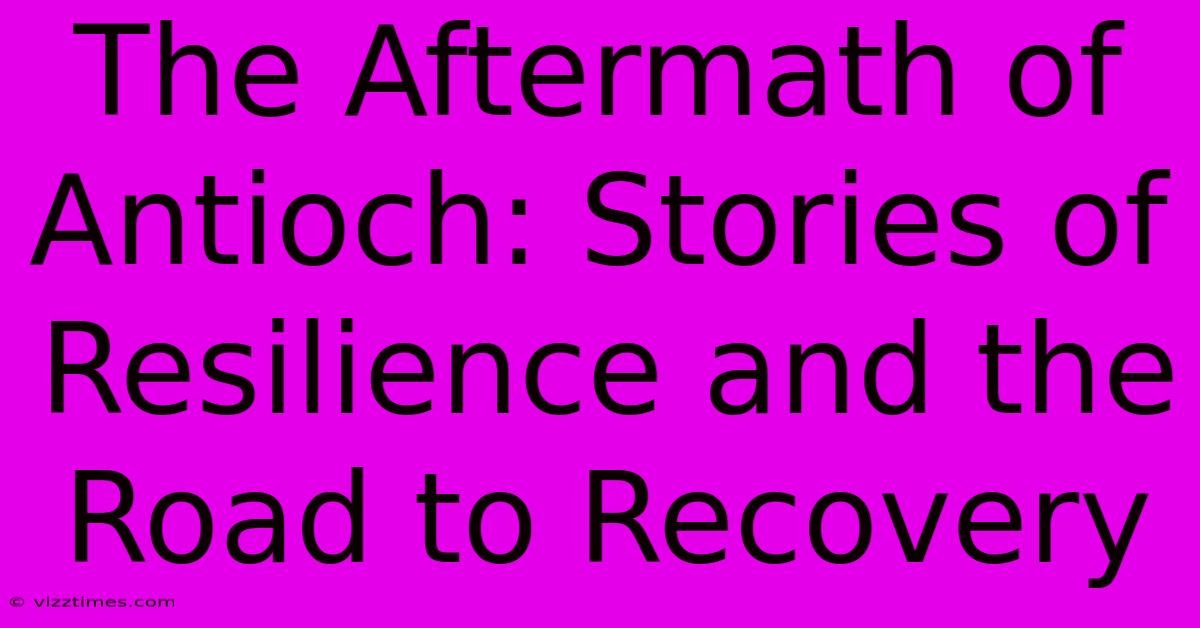The Aftermath Of Antioch: Stories Of Resilience And The Road To Recovery

Table of Contents
The Aftermath of Antioch: Stories of Resilience and the Road to Recovery
The February 6th earthquakes that devastated Turkey and Syria, particularly the city of Antioch (Antakya), left an unimaginable scar. It wasn't just buildings reduced to rubble; it was the shattering of lives, communities, and a history stretching back millennia. This isn't just a news story; it's a human tragedy on a massive scale. And the aftermath? It's a complex tapestry woven with threads of grief, resilience, and the painstaking, slow work of rebuilding.
The Immediate Chaos: A Personal Account
I'll never forget the first reports. The images were horrific. My heart sank. I have family in a nearby village, thankfully unharmed, but the stories pouring out of Antioch were gut-wrenching. I saw videos of people desperately digging through the debris, the cries piercing the air. Communication was patchy; getting through to people was a nightmare. The sheer scale of destruction was beyond comprehension. It felt like the end of the world, to be honest. The aftershocks just added to the terror. It was days before I could even begin to process what had happened.
The initial response, while well-intentioned, was chaotic. Getting aid to where it was needed most was a logistical nightmare. Roads were blocked, infrastructure destroyed. The sheer number of people needing help overwhelmed the resources available. I saw firsthand the frustrations—the delays, the unmet needs. It was incredibly frustrating, but it also highlighted the incredible strength of the human spirit.
Resilience in the Face of Devastation
Despite the unimaginable loss, the stories of survival and resilience emerging from Antioch are truly inspiring. I read about families huddled together in the ruins, sharing what little food and water they had, helping each other. I spoke with a woman whose entire apartment building collapsed, yet she managed to pull her children from the rubble, alive. Her strength, her quiet determination, it was something else. These people were not just survivors; they were heroes.
These weren't just isolated incidents; this resilience became a common thread in numerous stories. Neighbors helping neighbors, strangers offering comfort and support. The community spirit, even in the face of unspeakable loss, was deeply moving. It showed me that even in the darkest of times, hope and compassion can bloom. It was a powerful reminder of the strength that can be found in humanity. It made me cry, honestly.
The Long Road to Recovery: Rebuilding Lives and Communities
The immediate aftermath is just one chapter in this ongoing story. The road to recovery will be long and arduous. Rebuilding homes, restoring infrastructure, and addressing the emotional trauma of the survivors will require a sustained, international effort. It's not just about bricks and mortar; it's about rebuilding lives, families, and communities.
We are talking about years, possibly decades, of work. The psychological impact on the survivors will likely be felt for generations. Children who witnessed the destruction, families who lost everything, this trauma needs to be addressed comprehensively. Mental health support needs to be a key element in any long-term recovery plan. This is incredibly important, seriously.
Supporting the Recovery Effort: What You Can Do
If you're reading this and want to help, there are many ways you can contribute. Donations to reputable aid organizations are crucial. These organizations are on the ground, providing essential supplies, medical care, and support to those in need. They are working tirelessly to meet the immediate needs and build towards the long-term recovery. Research carefully to ensure you’re donating to a trustworthy organization.
Beyond financial contributions, raising awareness is equally important. Sharing stories, advocating for continued support, and keeping Antioch in the public eye can help maintain momentum in the recovery effort. The world needs to continue to show solidarity with those affected by this devastating tragedy.
Lessons Learned: Preparedness and Global Solidarity
The Antioch earthquake serves as a stark reminder of the importance of earthquake preparedness. Stronger building codes, improved early warning systems, and comprehensive disaster response plans are vital for mitigating future tragedies. This is something that needs to be addressed globally. The events in Antioch underscored the need for international cooperation in disaster relief. The response to the earthquake highlighted both the successes and the shortcomings of global solidarity. Effective and coordinated efforts are crucial in responding to such immense crises. There’s a lot to learn, and a lot of room for improvement. I hope we all pay close attention.
Conclusion: A City's Enduring Spirit
Antioch, a city steeped in history and culture, has been dealt a devastating blow. But the resilience of its people, their unwavering spirit, is a testament to the enduring strength of the human heart. The road to recovery will be long and challenging, but with continued support and unwavering commitment, Antioch can and will rebuild. It will be different, for sure, but it will endure. And that, in itself, is a powerful story of hope. I have hope for Antioch. I know they will rebuild. I know they will be stronger. I hope you do too.

Also read the following articles
| Article Title | Date |
|---|---|
| Beyond The Big Names Uncovering Uniteds Romanian Transfer Strategy | Jan 24, 2025 |
| Scouting Report What Type Of Player Does Manchester United Need From Romania | Jan 24, 2025 |
| The Aftermath Of Antioch Stories Of Resilience And The Road To Recovery | Jan 24, 2025 |
| Australian Open Upset Djokovics Semifinal Match Cut Short | Jan 24, 2025 |
| Oscars 2025 Nominations The Complete List Revealed | Jan 24, 2025 |